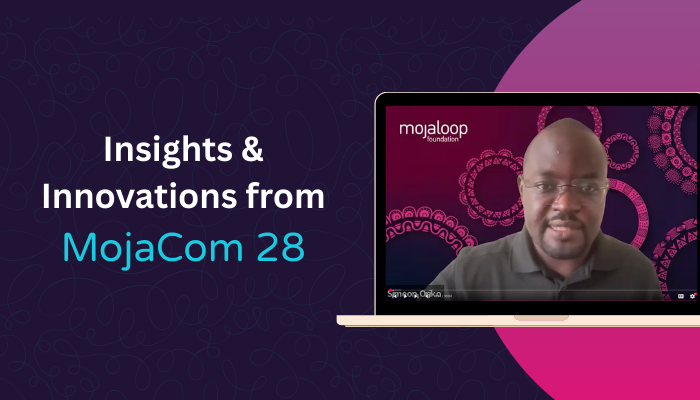From July 22–24, 2025, members of the Mojaloop Community and international guest experts gathered online for MojaCom 28. The 230 participants included representatives from DFSPs, regulators, private-sector partners, and individual specialists in payments, finance, fintech, economic development, and software development.
Over three days, the conference highlighted Mojaloop’s progress and the opportunities ahead with technical demonstrations and sessions focused on practical solutions for scalable IIPS.
Recordings of every session are now available on the Mojaloop Foundation’s YouTube channel, offering everything from detailed technical explorations to broad discussions on themes such as fraud prevention and cross-border payments.
Start with these Sessions
While there were a host of valuable sessions in MojaCom 28, we’ve chosen the following presentations as a reflection of the range of insights shared at the event.
Mojaloop Platform Quality & Security — Sam Kummary
Technical Director Sam Kummary led a deep dive into the latest updates on Mojaloop’s software quality and security standard assurance processes and future development. While designed primarily for the open source development team, the discussion offered a valuable look at how Mojaloop ensures a robust release process and strong security practices. Key topics included the hardening of Mojaloop releases, internal and external security testing, and reviews of the codebase and repositories. Sam also highlighted updates to maintenance tooling (license-scanner and CI), GitHub and repository management, addressing reported issues in the core, generating SBOMs for dependencies, and improving provenance for Mojaloop artifacts (helm charts to be supported in v17.1.0) — underscoring the Foundation’s commitment to reliability and transparency in every release.
Mojaloop Workstream Governance Guidelines — Simeon Oriko
Director of Community Simeon Oriko led a session to help members — especially those new to the Mojaloop Community — understand how workstreams operate and how to get involved in one. Because workstreams are at the core of everything the Community does, the session focused on clarifying what makes a project an official workstream, the responsibilities of workstream leads, and the roles of the Design Authority (DA), Change Control Board (CCB), and Community Council (CoCo). Simeon also explained how the Mojaloop Foundation supports volunteers, how workstream status is characterized, and how incubation and go-to-market projects are managed. The guidelines are designed to ensure transparency, accountability, and collaboration, with a clear structure that allows qualified leads and the wider Community to succeed.
DFSP-in-a-Box: Mojaloop and CBS in a Zero-Touch, Field-Ready Stack — Yevhen Kyriukha
Longtime Community contributor and current contractor Yevhen Kyriukha shared ongoing work to apply the SKYNEX edge node platform for faster DFSP onboarding in rural and/or low-income areas. Here, SKYNEX acts as the infrastructure layer replacing the internet router, enabling even very small providers such as SACCOs and MFIs to connect to a Mojaloop-powered payments system. The stack can integrate participants across the DFSP spectrum, from paper-based or spreadsheet-driven processes to REST adapters and secure pass-through routers.
Yevhen provided a look at the edge node hardware, the modular software stack, and the zero-touch onboarding process, showing how deployments can scale without upfront CAPEX or OPEX — or even reliable internet. SKYNEX has already been deployed in large rural networks, and it promises to reduce onboarding timelines from weeks to minutes.
While technical in scope, the session was accessible to non-experts and closed with more than 30 minutes of engaged Q&A, underscoring the strong interest in solutions that lower barriers to Mojaloop adoption.
Tazama: Collaborating to Build a Front Against Fraud in Africa’s Financial Ecosystem — Justus Ortlepp
Tazama Head of Product Justus Ortlepp, a longtime Mojaloop Community contributor, led a session examining the impact of fraud—particularly on low-income populations—and strategies to combat it. He opened with a striking analogy, describing fraud organizations as “a swarm of locusts” that move across countries, targeting new victims with sophisticated and constantly evolving scams managed by large teams.
Tazama is a free, open-source transaction monitoring platform designed to detect fraud proactively, without vendor lock-in. It offers a global, scalable, and cost-effective solution for real-time transaction monitoring and fraud pattern analysis, with a focus on emerging markets where safe digital financial tools are often lacking. Originally built to integrate with the Mojaloop platform, Tazama is already deployed in multiple countries, with additional proofs of concept either underway or completed.
Justus emphasized the importance of a collective response to fraud—reporting new trends, linking patterns, sharing intelligence, and focusing on prevention rather than post hoc remediation. He highlighted that reliable digital financial ecosystems are essential to building trust and encouraging people to move away from cash-only transactions, making each payment safer. He also explained how organizations can advance their fraud-prevention efforts without waiting for regulations to catch up.
The session included a demonstration of Tazama in action, showing how the system blocks attempts to drain funds from accounts using centralized transaction management and shared intelligence. Notably, Tazama no longer relies on a centralized suspicious account list to prevent fraudulent activity, highlighting its efficiency and adaptability. Accessible to newcomers as well as experienced practitioners, this session offered practical insights into strengthening digital financial security while supporting financial inclusion.
Connect in Person at MojaCom 29
Join us for MojaCom 29, October 21–23, 2025, in Nairobi, Kenya — the premier in-person gathering for central bankers, hub operators, DFSPs, regulators, and digital financial leaders advancing inclusive instant payment systems (IIPS).
Participants will engage in panels, live demonstrations, and interactive sessions that showcase Mojaloop’s latest milestones and explore the future of real-world deployments. It’s also an unparalleled opportunity to connect with some of the most influential voices in inclusive payments and strengthen relationships across the global community.

